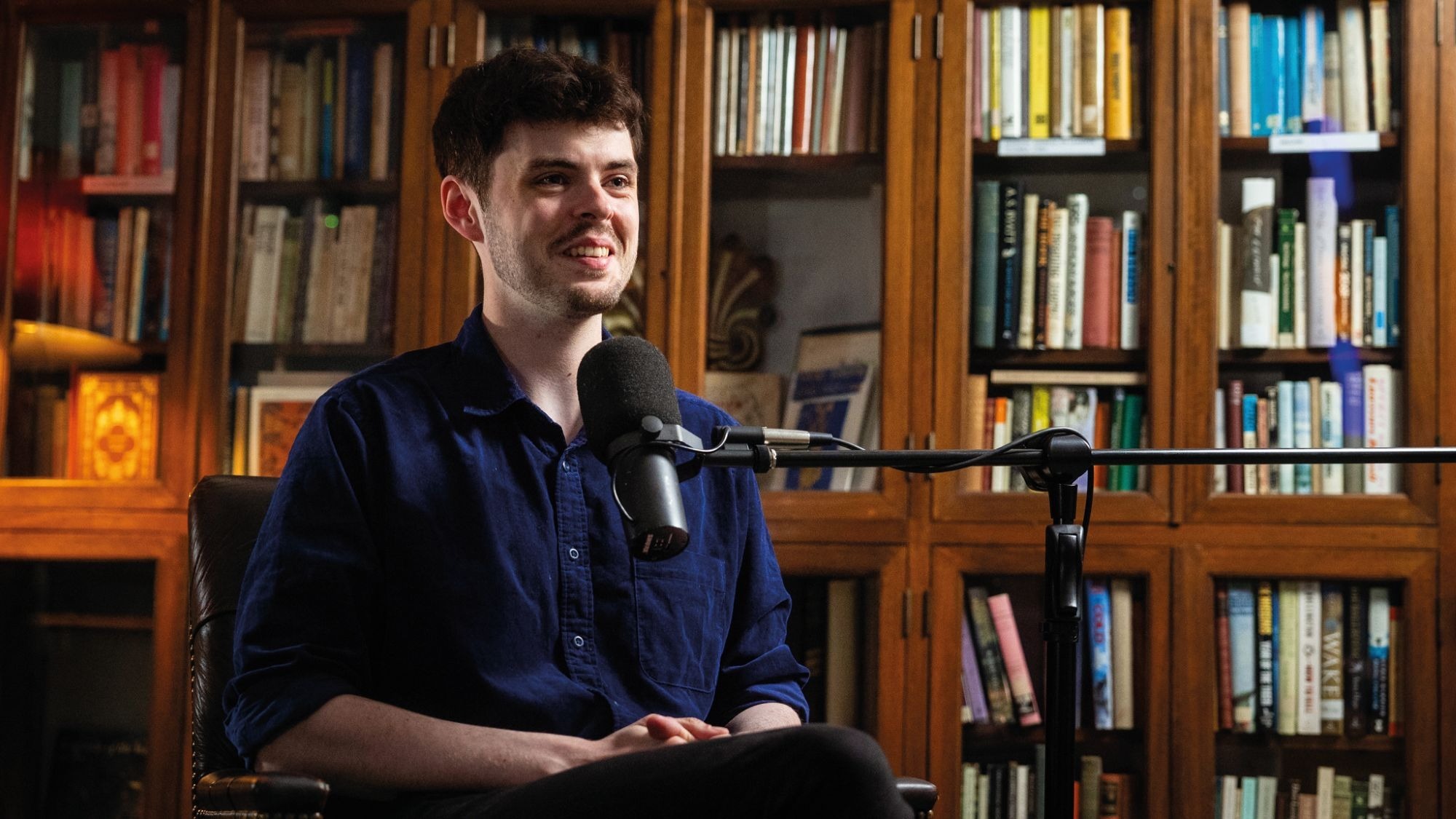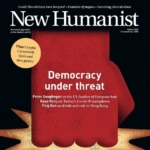From atheist YouTuber to praying for divine revelation, what has happened to Alex O’Connor?

As I went to meet Alex O’Connor for lunch in Soho, I have to admit I was feeling slightly intimidated. O’Connor is only 25 years old, yet he’s already managed to amass more than 1.3 million subscribers to his YouTube channel, the Cosmic Skeptic. He shows up wearing a black leather jacket, white T-shirt and silver necklace, and I’m immediately struck by his intense confidence – invaluable onstage, no doubt, but disarming in person.
I’m keen to know how O’Connor became the media’s go-to atheist pundit. He is celebrated for having respectful, in-depth conversations with the religious, as well as the irreligious. “I do think I’m a good interviewer,” he says. “I think I know how to ask the right questions of the right kind of person.” Apart from making a living from his own prolific output, including the podcast Within Reason, he is now the man you call to join a panel on the future of Christianity, or moderate a debate between Richard Dawkins and Jordan Peterson (the episode on memes and archetypes, aired on Peterson’s channel in October, quickly went viral). Just don’t ask Peter Hitchens to go for a drink with him – more on that later.
O’Connor knew from his teenage years that he wanted to broadcast his thoughts to the world. His first video, uploaded when he was just 17, was “The Paradox of Prayer – Why Praying Is Pointless”. “Hey everybody; it’s your friendly neighbourhood atheist here,” it begins. It is much more didactic and performative than the content that would come to define his channel. The distinctive moustache is years away. But his articulate commentary and ability to talk without hesitation (I suspect he’d be excellent on Just A Minute) is there fully formed. Not long after, when he “scraped” into Oxford to study philosophy and theology, he had 150,000 subscribers. By the time he left university, being a YouTuber was his job.
Since then, he’s made videos about subjects as varied as ChatGPT, veganism, pandemics and nuclear missiles. But it’s his encounter with Peter Hitchens that ranks as his most popular, with 3.5 million views. The reason it made such a splash is because, 42 minutes into the interview, Hitchens says he is fed up with talking about drug decriminalisation and spends 17 minutes berating O’Connor while standing off-camera, trying to leave. Hitchens erroneously claims that he was there under false pretences, leaving the baffled O’Connor to calmly defend himself. “I never ever want to see you again,” Hitchens says.
“It was entertaining,” O’Connor says now, knowing full well that the drama did wonders for his channel.
There is another Hitchens who looms large in any conversation about atheism, of course. O’Connor’s rise to fame occurred during, and perhaps contributed to, a cultural drift away from the New Atheism of the early 2000s. When O’Connor started YouTubing, Christopher Hitchens had already been dead for years. “He was the greatest rhetorician of the past 100 years,” O’Connor says, invoking the 2009 debate in which Hitchens and Stephen Fry trounce Ann Widdecombe and Archbishop John Onaiyekan on the question “Is the Catholic Church a force for good in the world?” But he now thinks the late atheist firebrand was less like a philosopher and more like a stand-up comedian, whose points tended to fall apart under scrutiny. He believes, in fact, that Hitchens was selling a kind of con. “He was insinuating that he had some kind of objective ethical framework, the adoption of which would improve the lives of those who adopt it. And that just hasn’t been the case.”
O’Connor first met the most renowned of the New Atheists, Richard Dawkins, as a student. Since then, they’ve had many encounters – recently in front of a packed Los Angeles theatre, with O’Connor hosting an evening on Dawkins’ last US tour. While he recognises Dawkins’ impressive contributions, he also points to what he believes are some “quite outdated and shallow ideas” on issues of theology. The appeal and the apparent promise of Dawkins, Hitchens, Sam Harris et al were positive, he says. If they hadn’t been, the movement wouldn’t have experienced the colossal level of support and coverage it achieved. But he calls its legacy “hollow and lukewarm”, as it failed to give people a sense of meaning in their lives. “I think that basically New Atheism failed to live up to its promises,” he says. He adds that he’s unsurprised that Ayaan Hirsi Ali, the conservative thinker and former politician, another of the prominent New Atheists, recently turned to Christianity.
Indeed, O’Connor believes that the Christian faith is making a sort of comeback. “I don’t know if Christianity will become dominant again – especially in England – but in the online intellectual space, let’s say, it’s becoming cool to be Christian.” When I press him on this point, he admits that it’s hard to put a finger on, and is anecdotal rather than statistical, but he believes that “something is changing in the air; the culture seems to be shifting a little bit.”
He points to figures like Jordan Peterson, who may be filling the vacuum that New Atheism left behind. Peterson offers sometimes controversial advice on how to live a good and fulfilling life which, while you might disagree with it, has captured the hearts of many. The Canadian philosopher is agnostic – but, much like O’Connor himself, seems to find value in Christianity’s teachings. Peterson’s latest book, We Who Wrestle with God, analyses Biblical stories in order to promote understanding “of our souls and our societies”.
O’Connor doesn’t think people are taking Peterson as seriously as they used to, but he finds much to admire in him. “I can tell that he is a man who really cares about what he’s doing. And he listens to you. It’s the one thing I always say to people; if you speak to him he stares at you. A bomb could go off and he’s there going, ‘Mm, mm, mm-hmm.’”
Peterson’s restyling as a lifestyle guru has proved particularly attractive to young men, who make up much of his follower base. He has also been accused of promoting regressive, patriarchal ideals. I ask O’Connor about why the online atheist community is male-dominated, with figures like Aron Ra, Matt Dillihunty and TJ Kirk – and of course O’Connor himself – attracting most attention. I also ask whether he sees any irony in atheism decrying misogyny while potentially being guilty of similar crimes itself. “Both YouTube and philosophy are male-dominated areas,” he says. “I’m not sure that there are more male than female atheists, but there are more who speak about it publicly. The same is likely true of Christianity, and certainly of Islam.” He reflects that prominent female atheists (Rebecca Watson, Emma Thorne and Jaclyn Glenn, for example) face far more negative attention from online trolls. “I find those women who manage to persevere in the face of it to be of outstanding courage,” he adds. “It is difficult to know how to fix this problem, but it is unfortunately not unique to any one online community, but rather a feature of everyday reality for many women, and more urgent still for that reason.”
While the disproportionate lack of high-profile women might have discouraged female viewers and engagement, might young men also be attracted to the atheist online community because they are seeking a sense of identity and direction? If so, O’Connor’s influence over his millions of viewers becomes even more noteworthy. He tells me that he’s an “aisle-reacher”, bridging a gap between Christians and atheists. Still, you might imagine that the Cosmic Skeptic, someone who regularly lambasts religion from an informed perspective, would fall confidently down on the atheist side of the spectrum. Not so. Instead he’s “painfully agnostic”, telling me that he’d love to be a Christian. “I’m still awaiting my religious experience. I hope and pray that it comes one day soon.” Does he really mean that? “Yeah, seriously, I mean that.”
What about it is appealing, I wonder? He says that when he’s close to being convinced by the arguments of Christianity, it’s because they scratch an itch that lies somewhere between comfort and logic. “It makes sense of something a bit more inexplicable,” he says. “It makes sense of the moral sensibilities of the people. It makes sense of some of the foundational mysteries of the universe that people just assume quite blindly that science will one day answer [but] they’re not even in the category of scientific explanation.”
Gravity, for example – while Newton was able to describe it, scientists still can’t explain why the laws of physics act as they do. O’Connor seems to believe they never will. By analogy, he imagines coming across a Shakespearean text completely cold, and noticing that it abides by various “laws”. “It’s like saying the laws of literacy will one day be able to describe the origin of a book of Shakespearean sonnets. It’s just a category error.”
While I may not agree on the idea that Christianity might better explain our world than science, O’Connor is a formidable opponent I wouldn’t want to go up against on any subject, let alone the one that he has been researching for half his life. When I leave my encounter with him, I don’t storm out and I certainly don’t feel like I never want to see him again. I think, in fact, that we’ll all be seeing a good deal more of him in the years to come.
This article is from New Humanist’s Summer 2025 issue. Subscribe now.

